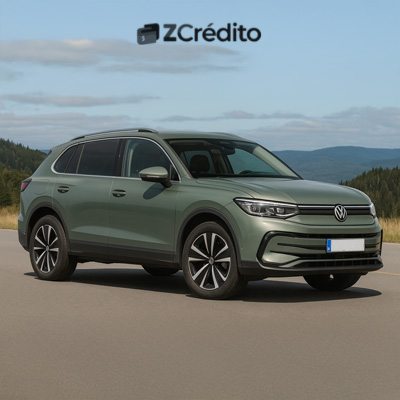VW Taos vs Tiguan: Which Volkswagen SUV Fits Your Lifestyle?
VW Taos vs Tiguan is a common comparison among drivers seeking a stylish, functional, and tech-forward SUV from Volkswagen’s lineup.
While both models offer compelling features and refined German engineering, they cater to slightly different needs and preferences.
Whether you’re focused on urban commuting, family road trips, or maximizing value, understanding their core differences will help you decide which SUV fits your lifestyle best, let’s see everything!
Key Differences Between VW Taos and Tiguan 🔑
Size and Interior Space
The VW Tiguan is the larger of the two, offering more passenger space and the option for a third-row seat, rare in the compact SUV category.
It’s ideal for families needing extra room. With the rear seats folded down, the Tiguan provides up to 73.5 cubic feet of cargo space, making it a practical choice for carrying large or bulky items.
In contrast, the VW Taos is smaller and easier to maneuver, making it an ideal option for city driving or for those with limited space needs.
Even with its compact size, the Taos delivers a generous 65.9 cubic feet of storage and a comfortable second row.
Performance and Efficiency
Beneath the hood, the VW Taos features a 1.5-liter turbocharged four-cylinder engine that produces 158 horsepower and offers impressive fuel economy, reaching up to 36 MPG on the highway.
The VW Tiguan, in comparison, comes with a stronger 2.0-liter turbo engine that produces 184 horsepower.
Though slightly less efficient, it provides stronger acceleration and a more composed ride at highway speeds. It’s a better pick if you prioritize power and need the muscle for family trips or light towing.
Price and Trim Options
Affordability is where the VW Taos shines. Starting at around $25,000, it offers great value with generous standard features like LED lighting, digital cockpit, and advanced safety systems. It comes in trims like S, SE, and SEL, allowing customization to match budget and preferences.
The VW Tiguan starts closer to $29,000 but justifies the premium with larger size, available AWD, optional third-row seating, and more upscale features in higher trims like the SE R-Line Black and SEL R-Line.
Driving Experience and Technology 🚗
Ride Comfort and Handling
The VW Tiguan has a longer wheelbase and more substantial suspension, resulting in greater stability at high speeds and on rough roads. It’s ideal for long highway drives.
The VW Taos handles with added agility, especially in crowded city areas. Its compact size helps with parking and maneuvering, and it still maintains impressive comfort for daily use.
Infotainment and Connectivity
Volkswagen equips both models with advanced infotainment systems, but the Tiguan often comes with larger screens and more features at higher trims.
It comes equipped with a standard 8-inch display, featuring wireless Apple CarPlay and Android Auto, along with an available Fender premium sound system.
The Taos also includes a standard 6.5-inch touchscreen (upgradable to 8 inches), plus wireless smartphone connectivity, multiple USB ports, and available satellite navigation.
Safety Features and Ratings
Both SUVs score highly in safety, with standard IQ.DRIVE features like Forward Collision Warning, Autonomous Emergency Braking, Adaptive Cruise Control, Blind Spot Monitor, and Lane Keeping Assist.
Crash tests from IIHS and NHTSA rate the VW Tiguan and VW Taos well, but the Tiguan holds a slight edge due to its size and additional available safety tech. Families may prefer the Tiguan for peace of mind.
Practical Aspects for Buyers 🔎
Fuel Economy and Maintenance Costs
The VW Taos leads in fuel efficiency, offering up to 28 MPG city and 36 MPG highway, making it a smart pick for daily drivers concerned about long-term fuel costs.
Although the Tiguan delivers slightly lower fuel economy (23 MPG in the city and 30 MPG on the highway), it makes up for it with stronger overall performance.
Maintenance costs for both are competitive within their class, and Volkswagen’s Carefree Maintenance covers the first two years or 20,000 miles.
Resale Value and Warranty Coverage
Both models hold their value well, with the VW Tiguan retaining a higher resale value thanks to its versatility and stronger brand perception. Volkswagen’s warranty includes:
- 4-year/50,000-mile limited warranty
- 2 years/20,000 miles of scheduled maintenance
- 7 years/100,000 miles of corrosion coverage
Technical Specifications 📋
VW Taos Technical Sheet:

- Engine: 1.5L turbocharged inline-4
- Horsepower: 158 hp
- Torque: 184 lb-ft
- Drivetrain: FWD or AWD
- MPG: 28 city / 36 highway
- Cargo Space: 65.9 cu ft (max)
- Towing Capacity: Not rated
- Seating: 5
VW Tiguan Technical Sheet:

- Engine: 2.0L turbocharged inline-4
- Horsepower: 184 hp
- Torque: 221 lb-ft
- Drivetrain: FWD or 4MOTION AWD
- MPG: 23 city / 30 highway
- Cargo Space: 73.5 cu ft (max, 2-row)
- Towing Capacity: 1,500 lbs
- Seating: 5 or optional 7
Final Verdict: Volkswagen Taos or Tiguan? 🎯
Choosing between the VW Taos vs Tiguan depends on your priorities. If you want an affordable, fuel-efficient SUV for urban use, the VW Taos is an excellent choice. It’s compact yet spacious, efficient, and packed with modern features.
If you need extra room, stronger performance, and advanced features for your family or active lifestyle, the VW Tiguan stands out with its larger cabin, optional third row, and premium trims.
Both vehicles embody Volkswagen’s signature refinement and offer excellent value, just in different packages tailored to different needs.
Frequently Asked Questions ❓
1. Do both models have AWD options?
- Yes. Both the Taos and Tiguan offer available all-wheel-drive configurations.
2. Which SUV is better for families?
- The Tiguan is better suited for families due to its size, optional 7-passenger seating, and stronger safety ratings.
3. What is the main advantage of the VW Taos?
- Its compact size, excellent fuel economy, and lower starting price make it ideal for city dwellers or first-time SUV buyers.